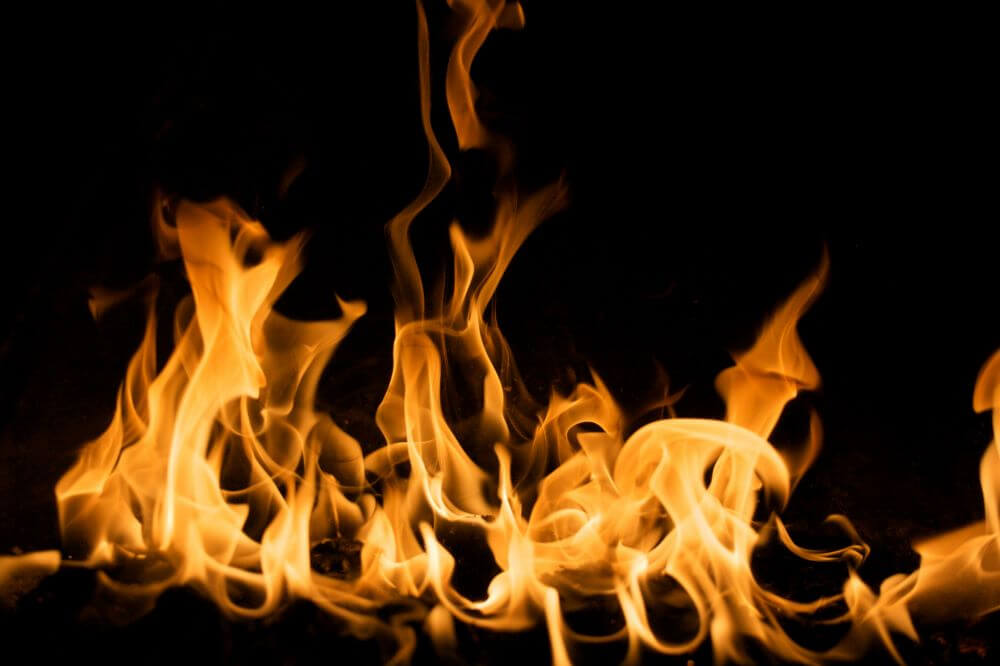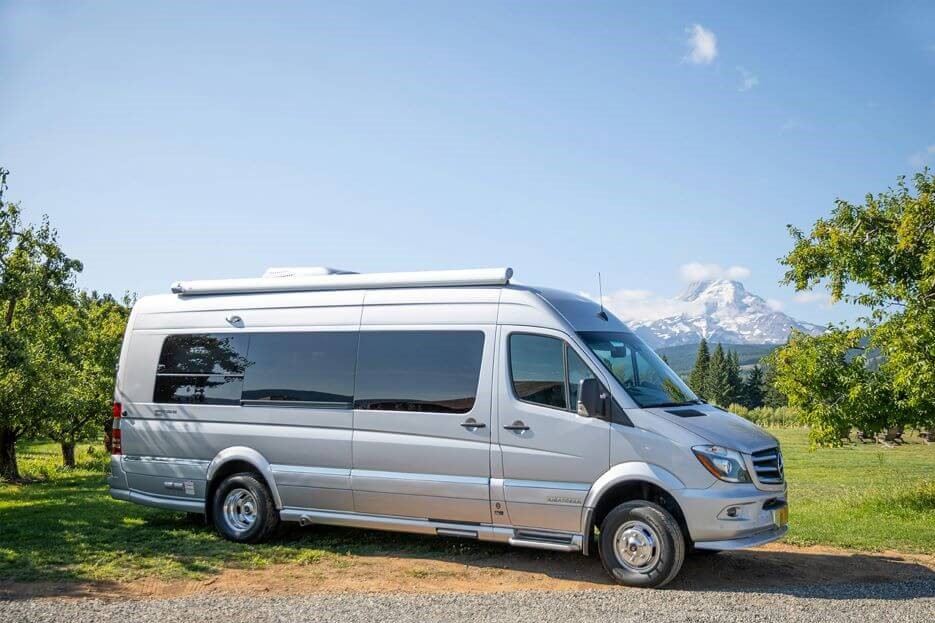An RV smoke detector alerts you to the presence of smoke or flames. It’s designed to save lives by rousing occupants so they can get out safely, especially if they’re sleeping. All new RVs come standard with three types of sensors, including the smoke detector.
As you browse other articles, shop, and chat with fellow campers, remember that you need one each – or combined units – of these three sensors for your RV: a smoke, a carbon monoxide (CO), and a propane (LP) detector. Since each must be replaced from time to time, and may need batteries depending on the model, it’s important you understand this safety issue.
What is an RV Smoke Detector?
An RV smoke detector senses the particles in smoke from the early stages of a fire in your RV and emits a loud sound so that you and others inside can evacuate. In the case of a small, visible, fire, you might use a fire extinguisher to put it out. If the fire has started to grow or spread, the most important thing to do is to get you and others out of the RV to stay safe.
While manufacturers create hard wired 12V CO and LP detectors for RVs’ special, rugged requirements, many smoke detectors work well in either a home or an RV environment. The majority of hardwired smoke detectors use 120V home wiring, however, so look for a battery unit instead.
If you purchase one with a 10-year pre-installed battery, you won’t ever have to replace it, since you’ll have to buy a new unit every 10 years. You must replace 9V or AA batteries in other smoke detectors every six months, so factor in this expense when considering the added cost of a 10-year lithium built-in model.

Key Features of RV Smoke Detectors
Type of Sensor
When replacing your smoke detector or buying a new one, you’ll come across two types of sensors: ionization and photoelectric. According to First Alert, “Smoke particles of varying number and size are produced in all fires. For maximum protection, use both ionization and photoelectric sensing technologies. Ionization alarms are generally more sensitive to fast flaming fires and photoelectric alarms are generally more sensitive to smoldering fires.”
Size
You’ll want to measure the size of your current smoke detector, and also the distance between the screws, when looking at the dimensions of a new one. Look for a test button, and silence button, generally the same one. Most alarms continue working even after you press the silence button.
Smart Detectors
Some battery-powered smoke detectors communicate with your smartphone, so if you’re looking for smart features, consider those. They may also include a human voice instead of an alarm, early warning of kitchen-smoke issues, and smartphone alerts.
Don’t Remove or Disable Your Smoke Detector
All RVs manufactured in the last 30 years included a mandatory smoke detector when first sold. Yet a National Fire Protection Agency 2020 analysis of RV fires found that in 84% there was no smoke detector. The researchers noted the reason: the owners likely removed it. Given a fire, an RV with no smoke detector saw nearly three times as many fatalities as an RV with a smoke detector. Since more of these tragedies started in the middle of the night, the smoke detectors that woke people inside saved lives.
Why would an RV owner remove their smoke detector? Maybe because they don’t understand its importance, don’t have the right type of detector, or don’t maintain it.
Tips To Avoid Nuisance Alarms
Some newer smoke alarms include sensor technology that reduces the chance of false alarms. But to lessen the chance of your smoke alarm sounding inadvertently, you can also try these tips:
- Use lower temperatures and turn on your fan when cooking – open windows, too, if possible
- Cook using a slow-cooker, electric skillet, or microwave which are less likely to set off the smoke detector
- Wipe crumbs and bits of food off your burners and toaster, and keep your oven clean
- Vacuum the detector
- Vent or use the bathroom fan to reduce the steam from your shower
- Remember that if you have a dual smoke/carbon monoxide detector, the CO may actually be causing the alarm
- Check for an insect inside the alarm, and consider units that protect from bugs
- Remember that outside BBQ smoke can trigger the alarm so close doors
- Check the battery, especially if the alarm is chirping instead of sounding – 9V or AA battery units need new ones once or twice every season (check owner’s manual)
- A smoke detector must be replaced, usually every 10 years so may be sounding if it has reached the end of life
RVs Carry More Carbon Monoxide Risk So Keep Your CO Detector Working
Carbon monoxide, or CO, can’t be seen or smelled, yet proves poisonous to animals and humans. According to the Tennessee Department of Health, “In campers and RVs, items that emit carbon monoxide include built-in or portable generators, gas-powered heaters, gas ranges or ovens, portable camp stoves and gas water heaters.”
RVs Use Propane So You Need an LP Detector
Propane detectors test for gas leaks directly, whereas carbon monoxide results from burning propane or other fuels so must be detected separately. You need both sensors, either separate ones or dual.
Get Clear On What Your Dual-Purpose Detector Does
Dual Carbon Monoxide and Propane Detector
You’ll find both separate and dual hard-wired, 12V detectors specifically made for RVs. Both types of detectors require replacement after five years, so you might take your cue from how your RV came equipped as to whether to get individual sensors or a dual unit. Of course if you purchase a dual-purpose, battery-powered smoke and CO detector, go ahead and install a stand-alone, hard-wired propane detector as well.
Take a look at the following top selling, well-reviewed CO and LP detectors, both dual and stand-alone:

Dual Smoke Detector and Carbon Monoxide Detector
Some smoke detectors come combined with a CO detector. If your RV only includes a hard-wired LP detector, a dual smoke/CO detector makes sense. Since smoke detectors generally last twice as long as CO detectors, though, it’s best to keep these two separate.
What to Look for When Purchasing an RV Smoke Detector
When buying an RV smoke detector, know that any legal unit in the US comes UL certified, so look for the imprint and buy a reputable brand. Long-life batteries, particularly those that last for the life of the unit, keep you from continually dealing with the chirp-chirp of a low battery. Buying a dual-sensor, ionization and photoelectric model extends the capacity of the protection.
Recommendations: The Best RV Smoke Detectors on the Market

Keep a working fire extinguisher on hand – ideally one with a secure mounting bracket for the bumps of the road. Lastly, remember: you need three types of detectors, alone or in combination, for your RV at all times: a smoke detector, a CO/carbon monoxide detector, and an LP/propane detector. Have a safe adventure!

FAQs
Do you need a special smoke detector for an RV?
For an RV, you’ll need a battery-operated smoke detector, not one of the 120V hard-wired kind made for houses, since that voltage would not work in a camper, trailer, or RV. Few battery-operated detectors are specifically for an RV. Look for a combination ionization and electromagnetic one and consider a built-in lithium battery that lasts for the 10-year life of the unit.
How are RV smoke detectors different from house ones?
Hard-wired, 120V smoke detectors work in houses but not in RVs. While First Alert makes a specific RV unit similar to OEM units, other battery-powered detectors work in RVs as well as homes.
How many watts does a RV smoke detector use?
Carbon monoxide and propane detectors, made to replace 12V, hard-wired units that came with the RV, pull small amounts of watts. A smoke detector for an RV works off of batteries, though, so doesn’t use any power from the RV itself.
What is the best RV smoke detector?
Look at the First Alert 10-year battery ultimate protection, with a built-in lithium ion battery that lasts for the life of the unit. It uses both ionization and electromagnetic sensors.
Are RV smoke detectors cold rated?
Smoke detectors, carbon monoxide (CO) detectors, and propane (LP) detectors perform between 40 and 100 degrees Fahrenheit.
Other Articles You May Enjoy
RV Bidets
Class B RV Interior Design
What Are the Best RV Mattress Toppers?
Tips for First Time RVers





